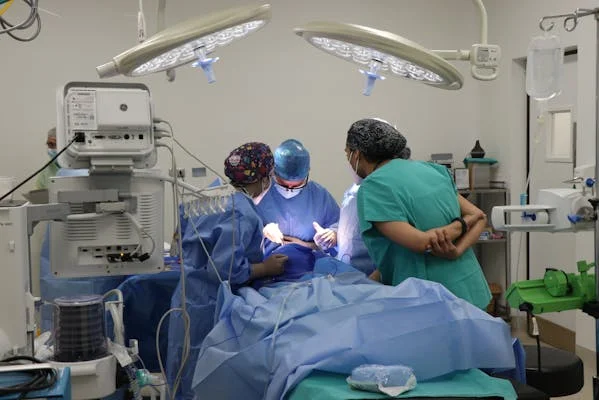If you’re considering a career in healthcare but want to get started quickly, the 6-week surgical tech program could be the perfect option. Surgical technologists, or surgical techs, play a vital role in assisting during surgeries, making the operating room a highly specialized and rewarding environment. In this guide, we’ll walk you through the details of a 6-week surgical tech program, what you can expect to learn, and why it’s a great stepping stone for a successful career in the medical field.
What is a Surgical Tech?
Surgical technologists, also known as operating room technicians, are healthcare professionals who assist during surgical procedures. They work under the supervision of surgeons, nurses, and anesthesiologists to ensure the operating room is sterile and equipped with the necessary tools and instruments. Surgical techs are responsible for preparing the operating room, sterilizing equipment, and assisting with patient care before, during, and after surgeries.
Why Choose a 6-Week Surgical Tech Program?
A six-week surgical tech program is a fast-track way to gain the necessary skills and certifications to start working in the field. While most surgical tech programs last longer—typically around 9 to 24 months—the six-week program offers an accelerated learning path for those eager to enter the workforce quickly.
Here are some of the benefits of enrolling in a 6-week surgical tech program:
- Quick Entry into the Workforce: A 6-week program allows you to start your career quickly, which is ideal if you’re eager to join the healthcare sector.
- Focused Curriculum: These programs are designed to provide an intense, focused learning experience with practical training. You’ll gain the core skills needed to work in an operating room.
- Hands-On Training: Most programs emphasize hands-on experience, ensuring that you get real-world practice in a clinical or hospital setting.
What Does the 6-Week Surgical Tech Program Entail?
A 6-week surgical tech program packs a lot of essential training in a short amount of time. The curriculum typically focuses on the following key areas:
Sterile Techniques and Infection Control
Sterile techniques are essential to prevent infection during surgical procedures. Surgical techs are taught how to maintain a sterile environment in the operating room. This includes proper handwashing, sterilizing surgical instruments, and ensuring all tools used are bacteria-free.
Surgical Instruments and Equipment
Understanding surgical instruments is a critical component of any surgical tech program. During the 6-week program, you’ll become familiar with the different types of surgical tools and their uses. You will also learn how to properly prepare, maintain, and handle these instruments during surgeries.
Assisting with Surgeries
One of the main responsibilities of a surgical tech is assisting during surgeries. In your six-week program, you’ll learn how to prepare the patient, assist with positioning, and provide the surgeon with the required tools during the procedure. This includes learning how to anticipate the needs of the surgical team and handle instruments efficiently.
Anesthesia and Patient Care
Surgical techs work closely with anesthesiologists and nurses to ensure patients are adequately sedated and monitored during surgery. The 6-week program will teach you how to assist in patient care, including preparing anaesthesia supplies, monitoring vital signs, and ensuring patient Comfort and safety.
Post-Operative Care and Clean-Up
After surgery, surgical techs help clean up the operating room and ensure that all used instruments are properly sterilized. You’ll also be trained in handling specimens, providing post-operative care to patients, and preparing the operating room for the following procedure.
Certification and Licensing
In many states, surgical techs must become certified before working in a healthcare facility. After completing the 6-week surgical tech program, you may be eligible to sit for the Certified Surgical Technologist (CST) exam offered by the National Board of Surgical Technology and Surgical Assisting (NBSTSA). While Certification is not always required, it can significantly improve your job prospects and earning potential.
To become certified, you must pass the CST exam, which tests your knowledge and understanding of surgical procedures, instruments, sterilization practices, and patient safety. Certification usually lasts four years, after which you’ll need to complete continuing education to maintain your credentials.
Career Opportunities After Completing a 6-Week Surgical Tech Program
After completing a 6-week surgical tech program, you can begin working in various healthcare settings. Some of the most common employers of surgical technologists include:
- Hospitals: Most surgical techs work in hospitals, assisting in surgeries across various medical specialities.
- Outpatient Surgical Centers: These centres focus on less invasive surgeries, and surgical techs are needed to assist in these procedures.
- Medical Research and Education: Some surgical techs work in research facilities or teaching hospitals, contributing to medical education and advancements in surgical techniques.
- Military: Many surgical techs find employment in the military, assisting in surgeries for military personnel.
With the demand for healthcare professionals rising, there are numerous job opportunities for certified surgical techs. The U.S. Bureau of Labor Statistics (BLS) projects that the employment of surgical technologists will grow by 6% from 2021 to 2031, which is about as fast as the average for all occupations.
Skills You Will Gain in a 6-Week Surgical Tech Program
Here are some of the key skills you’ll develop during a 6-week surgical tech program:
- Sterilization Techniques: Learn how to ensure that all instruments and the operating room are free from contaminants.
- Surgical Instrument Handling: Become proficient in handling instruments, from scalpels to forceps, ensuring that they are used correctly during procedures.
- Communication: Develop strong communication skills to effectively work with surgeons, nurses, anesthesiologists, and other medical staff.
- Attention to Detail: Surgical techs must be detail-oriented to prevent mistakes and ensure surgeries go smoothly.
- Critical Thinking: The ability to think quickly on your feet is crucial in the operating room, especially in emergencies.
Is a 6-Week Surgical Tech Program Right for You?
If you’re looking for a fast way to enter healthcare, a 6-week surgical tech program could be a great choice. While it may not cover all aspects of a traditional, more extended program, it provides a focused curriculum that prepares you for the essentials of surgical technology. This option is ideal for those passionate about healthcare and who want to start making a difference as soon as possible.
However, it’s important to note that this accelerated program requires dedication, focus, and a willingness to learn quickly. It might not suit everyone, especially if you prefer a more extended, in-depth learning experience.
Conclusion
The 6-week surgical tech program offers an exciting and fast-paced path to entering the healthcare industry. Through focused instruction, hands-on experience, and certification opportunities, you can start your career as a surgical technologist in just six weeks. Whether looking for a rewarding job in a hospital or outpatient clinic or even considering military service, this program provides you with the essential tools to succeed.





